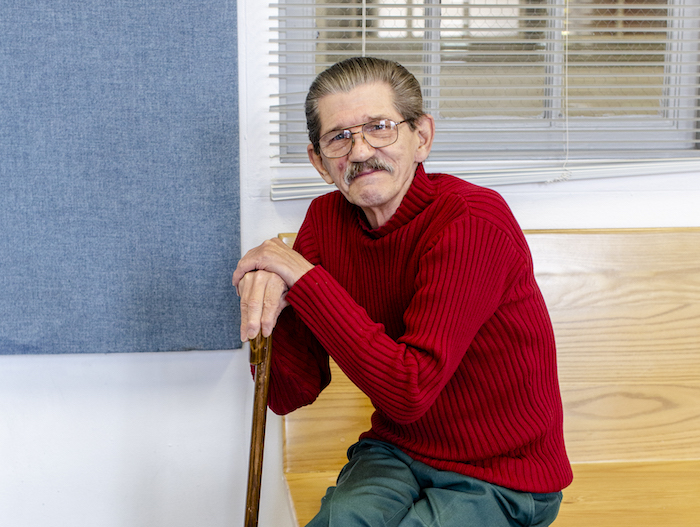
Steve Zeidman
Arnie Raimondo at Green Haven Correctional Facility.Long before anyone heard of coronavirus and feared it spreading like wildfire through prisons, men and women who have spent decades incarcerated, their families and advocates implored Governor Cuomo to exercise his vast clemency power and release thousands of deserving people from bondage.
Yet in 2019, the governor failed to commute a single person’s sentence.
In the past six weeks, the plea for clemency has taken on heightened urgency as it is apparent that prisons are hotbeds of COVID-19, daily threatening the lives of prisoners, correction officers, civilian employees, volunteers and their communities. Of particular concern are the grave consequences facing those CDC defined as most at risk – older people in prison and those with health issues.
Yet to date, the governor has failed to commute a single person’s sentence.
While there is a burgeoning national awareness of the need to address the eruption of COVID-19 in prison, too often the need is discussed in generic terms and obfuscates the reality that the issue is about actual people, individuals behind bars who fear for their lives.
About two years ago, Arnold Raimondo wrote to the Defenders Clinic at CUNY Law School seeking assistance with a clemency application. He wrote that he filed his own application in 2017 and yet “still have heard nothing.”
Arnie will turn 70this fall. He is serving a sentence of fifty years to life and has been in prison almost four decades. Arnie candidly wrote that he was convicted of a double homicide in Brooklyn and that, “I make no bones about it, I was a bad guy.” He’ll first be eligible for parole when, should he live that long, he’d be 81.
CUNY law students and their faculty supervisor Barbara Ho met with Arnie multiple times at Green Haven Correctional Facility. They gathered all his records from the Department of Corrections concerning the past 39 years and met with Arnie’s siblings to learn about re-entry plans. Arnie’s transformation through employment, programs, therapy, education, poetry and painting was profound and undeniable.

Arnie is a Vietnam War veteran. He enlisted two months after he turned seventeen and served in Vietnam with the Second Battalion of the 503rd Infantry Regiment, part of the 173rd Airborne Brigade. In his words, he saw atrocities “that no one, especially a teenager, should witness.” After a year in Vietnam, Arnie was medically evacuated for Hepatitis-A, a common malady among the troops, and did not fare well upon his return. Traumatized and filled with rage from the war, Arnie spiraled into years of destructive behavior culminating with his murder conviction almost forty years ago.
In 1989, Arnie co-authored an article about Post-Traumatic Stress Disorder that was presented at the annual meeting of the American Society of Criminology, and he continues to advocate for veterans. Years later, Arnie attempted to describe his experience in Vietnam through his paintings and poetry.
Arnie’s clemency application was filed with the governor’s office last fall. To date, there has been no response.
Recently, fearing the impact of COVID-19, we supplemented Arnie’s application to stress his age and his health. He has emphysema, an aortic aneurysm, and chronic arthritis has left him unable to walk without a cane. Green Haven prison was built in 1949. About 2,000 people are held behind its walls. It is antiquated, crowded and ill-equipped to handle any kind of medical emergency much less an epidemic like COVID-19.
 CityViews are readers’ opinions, not those of City Limits. Add your voice today!
CityViews are readers’ opinions, not those of City Limits. Add your voice today!
Two weeks ago, we learned that Brooklyn District Attorney Eric Gonzalez wrote a letter supporting Arnie’s clemency application. To date, there still has been no response from the governor.
Arnie is an exemplar, he’s extraordinary but actually typical – growth and transformation occurs daily in prison. Many other men in Green Haven, like Ulysses Boyd from Manhattan, Stanley Bellamy from Queens and Paul Clark from Brooklyn, submitted powerful clemency applications last year. They have served decades marked by extraordinary achievement and transformation – they voice genuine remorse and accept responsibility for the harm they caused, are no threat to public safety, and have much to offer on the outside. Now, like Arnold Raimondo, they are at grave risk inside due to their age and health issues. While they and countless others should have been released last fall, the coronavirus pandemic makes their continued incarceration even more akin to a death sentence.
In his initial letter requesting assistance with a clemency application, Arnie quoted William Shakespeare: “They say best men are moulded out of faults, and, for the most, become much more the better for being a little bad.”
Arnie, and thousands of others, are unquestionably much, much more the better. None of them deserve the new risk, due to the health crisis, of their continued incarceration becoming a death sentence. The governor should grant them clemency now.
Steven Zeidman is a professor of law at CUNY School of Law. He is on Twitter @SteveZeidman.









4 thoughts on “Opinion: If Ever There Were a Time for Clemency, It’s Now”
Man released from jail because of COVID-19 accused of killing someone the next day
https://www.wtsp.com/article/news/health/coronavirus/man-released-jail-coronavirus-accused-murder/67-864a61dc-4705-4699-8293-3d284056b045
I am the daughter of the man THIS ARNOLD RAIMONDO KILLED. HE SHOULD BE ROTTING IN JAIL! NOT RELEASED. WHAT HAS THIS WORLD COME TO? I CAN’T EVEN DESCRIBE WHAT I AM FEELING RIGHT NOW
God Forgive me for what I am going to say.
As a relative to one of the people this man killed “He should not be allowed out”. He killed two people in cold blood in the streets of Brooklyn. Where does it say that you get off for being nice after killing someone. Being the oldest in my family, I am now faced with explaining and listening to the cries of the past to family members to why he shouldn’t be dead himself. I hope this man never has peace in his life and may it be a short life (God willing).
I am the granddaughter of the man this monster killed. He brutally murder two people in cold blood ! Having him released or even considering is completely senseless! I never got to meet my grandfather and he had several children that had to fend for themselves after he was murdered by this man Arnold ! Your insane to think this is okay!